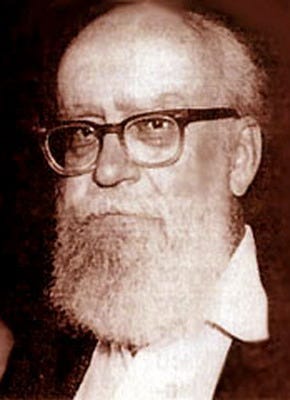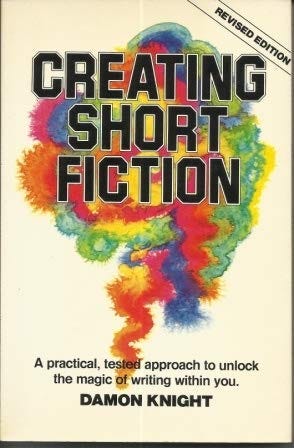Creating Short Fiction: A Review
A practical guide on writing short fiction from a master of the craft

As a short story writer, I’m always looking for ways to improve my craft, whether it be reading through anthologies, picking up a course, listening to lectures on YouTube, or simply good ol’ fashioned, pen-to-paper practice. About once a month, I pick up a craft book to further help expand my knowledge and learn new techniques. This month’s pick is Damon Knight’s book, Creating Short Fiction, which is full of interesting gems of wisdom dispensed by a master of the craft and a teacher of short fiction.
Let’s get to it!
The Author
Editor, short story writer, and novelist of science fiction and fantasy, Damon Knight was a master in his field. His body of work included seventy novels and seventeen short stories, including the story To Serve Man which was adapted for Rod Serling’s “The Twilight Zone” in 1962. Knight went on to be the founder of the Science Fiction and Fantasy Writers of America (SFWA), the Milford Writer’s Workshop, and later the Clarion Writer’s Workshop, where he and his wife, science fiction/mystery writer, Kate Wilhelm, would teach students how to write short fiction. In his introduction, Knight gives his best definition of what being a writer is:
“Psychologists have found out a little bit about the personalities of writers. They are individualists, skeptics, taboo-breakers, mockers, loners; they are undependable and likely to be behind on their rent; they keep irregular hours and have strange friends. Professional writers, like criminals, really live outside society: they have no regular jobs, they come and go as they please, they live by their wits.”
This passage gave me a good chuckle.
Knight goes on to introduce the reader to the full breakdown of how stories are crafted, whether they be a young, wide-eyed aspirant or a seasoned writer looking to brush up their skills. Everything from how a writer develops their talents, where to get ideas, starting stories, controlling stories, and the life of being a writer with the help of story examples, useful exercises, and career lessons.
Stages of a Writer’s Development
In the first chapter, Knight highlights the four stages of a writer, from the early days to professional status.
Stage 1. You are writing for yourself, and your stories are essentially daydreams. They please you in a sort of narcissistic way, but they are not stories that communicate to other people. (I'm not against narcissism in moderation; I believe that you have to love yourself before you can love anyone else. All I'm saying is that if you want to be a writer, narcissistic fantasy isn't enough.)
Stage 2. Now you are trying to break out of the shell, trying to communicate, but your stories are what editors call "trivial." You are not ready yet to write a completely developed story, and you're trying to get away with incomplete ones. The rejection slips tell you that you're not succeeding.
Stage 3. You are writing complete stories, or reasonable imitations, but you are being held back by technical problems, usually weaknesses in structure or character.
Stage 4. You have solved these problems, at least well enough to get by, and now you are working at the professional level
For me, this is helpful. Using the stages to gauge your skillset can help identify where your strengths and weaknesses lie as an artist and show you where to take the next stage in your career. Though I often fail to do it, reflecting on your past work and current progress is critical if you want to improve.
Exercises (and the Creative Subconscious)
After introducing a new theory or technique, Knight gives out some useful exercises to help students practice and really hone in on all the elements that make up a short story from using sensory detail to enhance story settings, practicing openings, economy and clarity of words, use of surprise, and priming your subconscious brain (Knight gives his subconscious the name, Fred) to spin out story ideas.
The conscious mind is trained in linear, logical thinking-if A then B and C, and so on. Fred works better in webs of association. The conscious mind can speak to Fred directly, but he can communicate only indirectly, through dreams, hunches, intuitions, and psychic nudges. It is as if there were a single unobstructed channel from the conscious to Fred, but a tortuous network of narrow channels coming the other way.
In most people, the two minds are like prisoners in adjoining cells who have never learned to use the means of communication they have. When Fred tries to say something, you repress it: "I don't want to think about that." Mental activity in most people is usually all conscious, all unconscious, or unconscious masquerading as conscious ("That will teach you," for instance, when they have just done something cruel to a child). These people do achieve some kind of functional equilibrium…
Now writing, like any art (and also very much like creative science and invention), is a thing you can't do without the close collaboration of the two parts of the mind. When you think about a creative problem, or even when you think something as simple as "I wish I had an idea for a story," you are sending a message to Fred.
Knight goes on to discuss the importance of feeding the creative voice from time to time with enough material such as music, theater, film, books, art, or anything to help continually stimulate the mind.
Critics talk about “the well of inspiration,” and they say that the well sometimes runs dry. What this means, in my opinion, is either that the author is feeling the lack of stimulating input, or that she has not given Fred time enough to think about the problem.
Keep the creative well flowing with enough material, give it time, and you will be rewarded. The best ideas will come when least expected.
Being a Writer
Though the meat of the book is primarily focused on tricks of the fiction trade, Knight does cover the ins, outs, ups, and downs of being a writer:
How to deal with frustrations from rejection slips that often don’t clue you in on what went wrong or how to improve your rejected story
Important work habits that will lead to success and consistent output
Dealing with creative slumps/slowdowns in productivity (I’ve been there!) and the ways to overcome them and get back to the writing chair
Though it’s a brief chapter, I found it the most useful for my current stage as a writer.
Final Thoughts
I enjoyed Damon Knight’s “How-to” book on writing short fiction. It is both insightful and fun to read, fully packed with an assortment of creative ways to practice and sharpen your storytelling chomps. There are some parts I don’t necessarily agree with, however, just as Bruce Lee said, “Absorb what is useful, discard what is useless and add what is specifically your own.”
I give this a 4/5 rating. If writing short stories is currently your creative jam, then you’ll want to check out this book.
I’ll let Mr. Knight close out this little review with this wonderful passage below from the final pages of the book.
“Throughout this book, in many ways, I have been trying to caution you against doing imitative work. I want to summarize these admonitions here. If you copy anyone else, you will inevitably lose some of the vitality and strength of the original. If, in the effort to conform to the requirements of a commercial market, you pay them lip service, your work will be insincere and unconvincing. Worse, you will have left out the only thing you really have to offer, your own talent, your own personality, and convictions. Even if you succeed in being published, you will find yourself among the unremembered writers, those who are bought only as a last resort. The only way to real success in writing is to find some space, even if it is only a small corner, that only you can fill.
Once you have done this and have begun to be published with some regularity, opportunities will come along; you may be offered a job or two. Magazines will begin printing your name on their covers; editors will ask, "When are you going to send me another story?" Eventually, perhaps before you are old and gray, your stories will be reprinted in anthologies. You will be invited to lecture or to conduct writing workshops. Younger writers will seek your company, hoping for words of wisdom. Do not write me complaining letters if none of this happens to you. There is no law that says it has to, but if you write honestly and with dedication, you will probably find that virtue really is rewarded; it just takes a while.”





Just wait! More book reviews on the way. Got a biography of a certain pulp writer lined up for August.
Stop adding to my To-Reads please Frank, thanks very much, that is all.